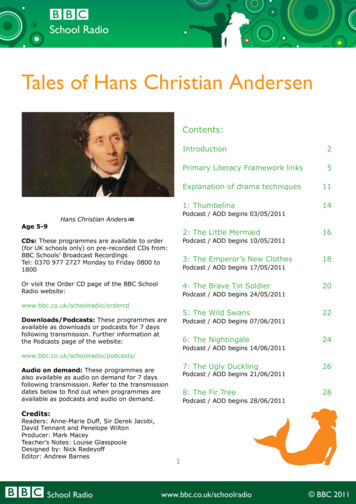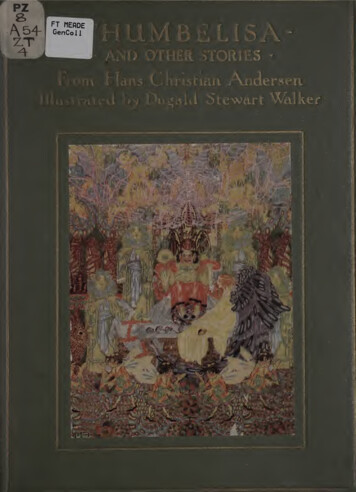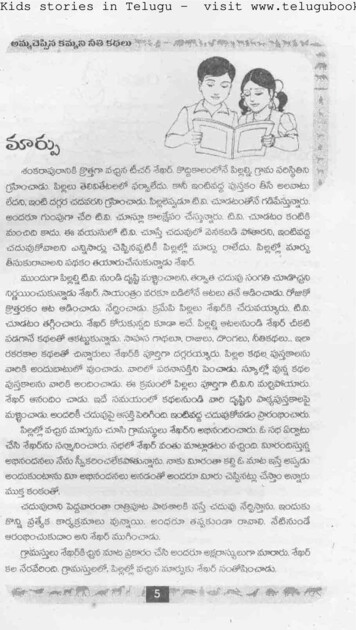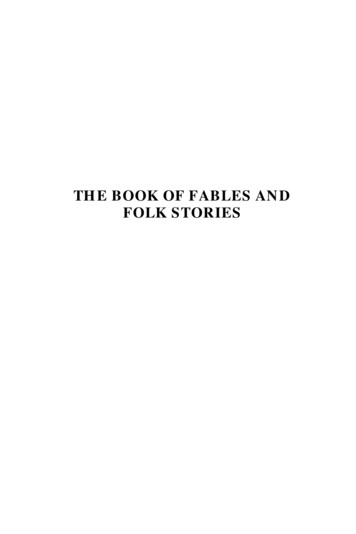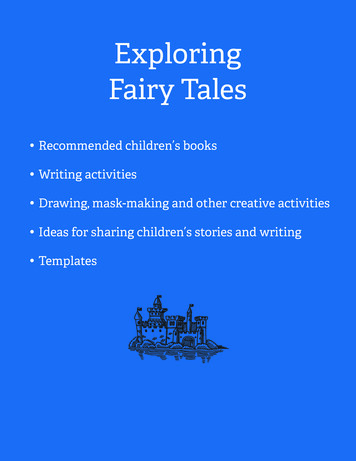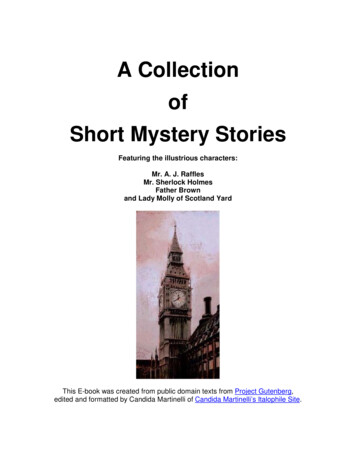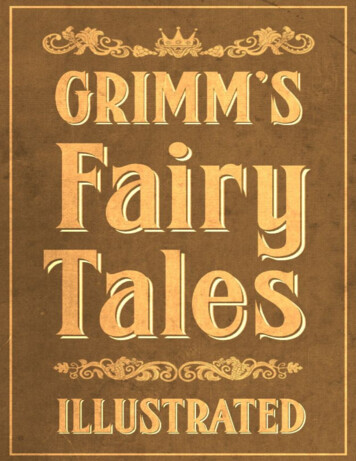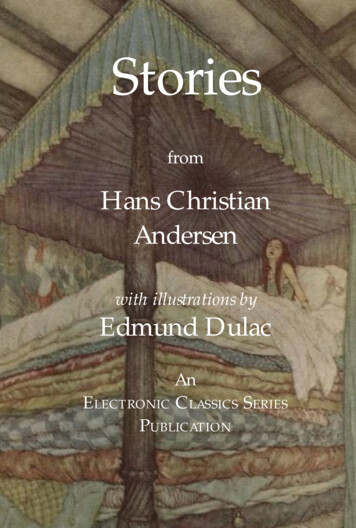
Transcription
StoriesfromHans ChristianAndersenwith illustrations byEdmund DulacAnELECTRONIC CLASSICS SERIESPUBLICATION
Stories from Hans Christian Andersen with Illustrations byEdmund Dulac is a publication of The Electronic ClassicsSeries. This Portable Document file is furnished free andwithout any charge of any kind. Any person using thisdocument file, for any purpose, and in any way does so athis or her own risk. Neither the Pennsylvania State University nor Jim Manis, Editor, nor anyone associated withthe Pennsylvania State University assumes any responsibility for the material contained within the document orfor the file as an electronic transmission, in any way.Stories from Hans Christian Andersen with Illustrations byEdmund Dulac, The Electronic Classics Series, Jim Manis,Editor, PSU-Hazleton, Hazleton, PA 18202 is a PortableDocument File produced as part of an ongoing publication project to bring classical works of literature, in English, to free and easy access of those wishing to make useof them.Jim Manis is a faculty member of the English Departmentof The Pennsylvania State University. This page and anypreceding page(s) are restricted by copyright. The text ofthe following pages are not copyrighted within the UnitedStates; however, the fonts used may be.Cover Design: Jim Manis; all images are by Edmund Dulacand are free of copyright restrictions within the UnitedStatesCopyright 2007 - 2013The Pennsylvania State University is an equal opportunity university.
Hans Christian AndersenContentsTHE SNOW QUEEN . 5THE NIGHTINGALE . 44THE REAL PRINCESS . 56THE GARDEN OF PARADISE . 58THE MERMAID . 74THE EMPEROR'S NEW CLOTHES . 99THE WIND'S TALE. 1053
StoriesOne day he was in a high state of delight because he had invented a mirror withthis peculiarity, that every good and pretty thing reflected in it shrank away toalmost nothing.4
Hans Christian AndersenTHE SNOW QUEENA TALE IN SEVEN STORIESFIRST STORYwhich deals with a mirror and its fragmentsNOW WE ARE ABOUT TO BEGIN, and you must attend; and when weget to the end of the story, you will know more than you do nowabout a very wicked hobgoblin. He was one of the worst kind; infact he was a real demon. One day he was in a high state of delightbecause he had invented a mirror with this peculiarity, that everygood and pretty thing reflected in it shrank away to almost nothing.On the other hand, every bad and good-for-nothing thing stoodout and looked its worst. The most beautiful landscapes reflected init looked like boiled spinach, and the best people became hideous,or else they were upside down and had no bodies. Their faces weredistorted beyond recognition, and if they had even one freckle itappeared to spread all over the nose and mouth. The demon thoughtthis immensely amusing. If a good thought passed through any one'smind, it turned to a grin in the mirror, and this caused real delightto the demon. All the scholars in the demon's school, for he kept aschool, reported that a miracle had taken place: now for the firsttime it had become possible to see what the world and mankindwere really like. They ran about all over with the mirror, till at lastthere was not a country or a person which had not been seen in thisdistorting mirror. They even wanted to fly up to heaven with it tomock the angels; but the higher they flew, the more it grinned, somuch so that they could hardly hold it, and at last it slipped out oftheir hands and fell to the earth, shivered into hundreds of millions5
Storiesand billions of bits. Even then it did more harm than ever. Some ofthese bits were not as big as a grain of sand, and these flew about allover the world, getting into people's eyes, and, once in, they stuckthere, and distorted everything they looked at, or made them see everything that was amiss. Each tiniest grain of glass kept the samepower as that possessed by the whole mirror. Some people even got abit of the glass into their hearts, and that was terrible, for the heartbecame like a lump of ice. Some of the fragments were so big thatthey were used for window panes, but it was not advisable to look atone's friends through these panes. Other bits were made into spectacles, and it was a bad business when people put on these spectaclesmeaning to be just. The bad demon laughed till he split his sides; ittickled him to see the mischief he had done. But some of these fragments were still left floating about the world, and you shall hear whathappened to them.6
Hans Christian AndersenMany a winter's night she flies through the streets and peeps in atthe windows, and then the ice freezes on the panes into wonderfulpatterns like flowers.7
StoriesSECOND STORYabout a little boy and a little girlIN A BIG TOWN crowded with houses and people, where there is noroom for gardens, people have to be con-tent with flowers in potsinstead. In one of these towns lived two children who managed tohave some-thing bigger than a flower pot for a garden. They werenot brother and sister, but they were just as fond of each other as ifthey had been. Their parents lived opposite each other in two atticrooms. The roof of one house just touched the roof of the next one,with only a rain-water gutter between them. They each had a littledormer window, and one only had to step over the gutter to getfrom one house to the other. Each of the parents had a large window-box, in which they grew pot herbs and a little rose-tree. Therewas one in each box, and they both grew splendidly. Then it occurred to the parents to put the boxes across the gutter, from houseto house, and they looked just like two banks of flowers. The peavines hung down over the edges of the boxes, and the roses threwout long creepers which twined round the windows. It was almostlike a green triumphal arch. The boxes were high, and the childrenknew they must not climb up on to them, but they were often allowed to have their little stools out under the rose-trees, and therethey had delightful games. Of course in the winter there was an endto these amusements. The windows were often covered with hoarfrost; then they would warm coppers on the stove and stick them onthe frozen panes, where they made lovely peep-holes, as round aspossible. Then a bright eye would peep through these holes, onefrom each window. The little boy's name was Kay, and the littlegirl's Gerda.In the summer they could reach each other with one bound, butin the winter they had to go down all the stairs in one house and up8
Hans Christian Andersenall the stairs in the other, and outside there were snowdrifts.'Look! the white bees are swarming,' said the old grandmother.'Have they a queen bee, too?' asked the little boy, for he knew thatthere was a queen among the real bees.'Yes, indeed they have,' said the grandmother. 'She flies where theswarm is thickest. She is biggest of them all, and she never remainson the ground. She always flies up again to the sky. Many a winter'snight she flies through the streets and peeps in at the windows, andthen the ice freezes on the panes into wonderful patterns like flowers.''Oh yes, we have seen that,' said both children, and then theyknew it was true.'Can the Snow Queen come in here?' asked the little girl.'Just let her come,' said the boy, 'and I will put her on the stove,where she will melt.'But the grandmother smoothed his hair and told him more stories.In the evening when little Kay was at home and half undressed,he crept up on to the chair by the window, and peeped out of thelittle hole. A few snow-flakes were falling, and one of these, thebiggest, remained on the edge of the window-box. It grew biggerand bigger, till it became the figure of a woman, dressed in the finest white gauze, which appeared to be made of millions of starryflakes. She was delicately lovely, but all ice, glittering, dazzling ice.Still she was alive, her eyes shone like two bright stars, but there wasno rest or peace in them. She nodded to the window and waved herhand. The little boy was frightened and jumped down off the chair,and then he fancied that a big bird flew past the window.The next day was bright and frosty, and then came the thaw—and after that the spring. The sun shone, green buds began to appear, the swallows built their nests, and people began to open theirwindows. The little children began to play in their garden on theroof again. The roses were in splendid bloom that summer; the littlegirl had learnt a hymn, and there was something in it about roses,and that made her think of her own. She sang it to the little boy,and then he sang it with her—9
Stories'Where roses deck the flowery vale,There, Infant Jesus, we thee hail!'The children took each other by the hands, kissed the roses, andrejoiced in God's bright sunshine, and spoke to it as if the ChildJesus were there. What lovely summer days they were, and howdelightful it was to sit out under the fresh rose-trees, which seemednever tired of blooming.Kay and Gerda were looking at a picture book of birds and animals one day—it had just struck five by the church clock—whenKay said, 'Oh, something struck my heart, and I have got something in my eye!'The little girl put her arms round his neck, he blinked his eye;there was nothing to be seen.'I believe it is gone,' he said; but it was not gone. It was one ofthose very grains of glass from the mirror, the magic mirror. Youremember that horrid mirror, in which all good and great thingsreflected in it became small and mean, while the bad things weremagnified, and every flaw became very apparent.Poor Kay! a grain of it had gone straight to his heart, and wouldsoon turn it to a lump of ice. He did not feel it any more, but it wasstill there.'Why do you cry?' he asked; 'it makes you look ugly; there's nothing the matter with me. How horrid!' he suddenly cried; 'there's aworm in that rose, and that one is quite crooked; after all, they arenasty roses, and so are the boxes they are growing in!' He kicked thebox and broke off two of the roses.'What are you doing, Kay?' cried the little girl. When he saw heralarm, he broke off another rose, and then ran in by his own window, and left dear little Gerda alone.When she next got out the picture book he said it was only fit forbabies in long clothes. When his grandmother told them stories healways had a but—, and if he could manage it, he liked to get behind her chair, put on her spectacles and imitate her. He did it verywell and people laughed at him. He was soon able to imitate everyone in the street; he could make fun of all their peculiarities andfailings. 'He will turn out a clever fellow,' said people. But it was all10
Hans Christian Andersenthat bit of glass in his heart, that bit of glass in his eye, and it madehim tease little Gerda who was so devoted to him. He played quitedifferent games now; he seemed to have grown older. One winter'sday, when the snow was falling fast, he brought in a big magnifyingglass; he held out the tail of his blue coat, and let the snow flakes fallupon it.'Now look through the glass, Gerda!' he said; every snowflake wasmagnified, and looked like a lovely flower, or a sharply pointed star.'Do you see how cleverly they are made?' said Kay. 'Much moreinteresting than looking at real flowers. And there is not a singleflaw in them; they are perfect, if only they would not melt.'Shortly after, he appeared in his thick gloves, with his sledge onhis back. He shouted right into Gerda's ear, 'I have got leave todrive in the big square where the other boys play!' and away hewent.In the big square the bolder boys used to tie their little sledges tothe farm carts and go a long way in this fashion. They had no end offun over it. Just in the middle of their games a big sledge camealong; it was painted white, and the occupant wore a white fur coatand cap. The sledge drove twice round the square, and Kay quicklytied his sledge on behind. Then off they went, faster, and faster, intothe next street. The driver turned round and nodded to Kay in themost friendly way, just as if they knew each other. Every time Kaywanted to loose his sledge the person nodded again, and Kay stayedwhere he was, and they drove right out through the town gates.Then the snow began to fall so heavily that the little boy could notsee a hand before him as they rushed along. He undid the cords andtried to get away from the big sledge, but it was no use, his littlesledge stuck fast, and on they rushed, faster than the wind. Heshouted aloud, but nobody heard him, and the sledge tore on throughthe snow-drifts. Every now and then it gave a bound, as if they werejumping over hedges and ditches. He was very frightened, and hewanted to say his prayers, but he could only remember the multiplication tables.The snow-flakes grew bigger and bigger, till at last they lookedlike big white chickens. All at once they sprang on one side, the bigsledge stopped and the person who drove got up, coat and cap smoth11
Storiesered in snow. It was a tall and upright lady all shining white, theSnow Queen herself.'We have come along at a good pace,' she said; 'but it's cold enoughto kill one; creep inside my bearskin coat.'She took him into the sledge by her, wrapped him in her furs, andhe felt as if he were sinking into a snowdrift.'Are you still cold?' she asked, and she kissed him on the forehead.Ugh! it was colder than ice, it went to his very heart, which wasalready more than half ice; he felt as if he were dying, but only for amoment, and then it seemed to have done him good; he no longerfelt the cold.'My sledge! don't forget my sledge!' He only remembered it now;it was tied to one of the white chickens which flew along behindthem. The Snow Queen kissed Kay again, and then he forgot allabout little Gerda, Grandmother, and all the others at home.'Now I mustn't kiss you any more,' she said, 'or I should kiss youto death!'Kay looked at her, she was so pretty; a cleverer, more beautifulface could hardly be imagined. She did not seem to be made of icenow, as she was outside the window when she waved her hand tohim. In his eyes she was quite perfect, and he was not a bit afraid ofher; he told her that he could do mental arithmetic, as far as fractions, and that he knew the number of square miles and the number of inhabitants of the country. She always smiled at him, and hethen thought that he surely did not know enough, and he lookedup into the wide expanse of heaven, into which they rose higherand higher as she flew with him on a dark cloud, while the stormsurged around them, the wind ringing in their ears like well-knownold songs.They flew over woods and lakes, over oceans and islands; the coldwind whistled down below them, the wolves howled, the black crowsflew screaming over the sparkling snow, but up above, the moonshone bright and clear—and Kay looked at it all the long, longwinter nights; in the day he slept at the Snow Queen's feet.12
Hans Christian AndersenThen an old, old woman came out of the house; she was leaningupon a big, hooked stick, and she wore a big sun hat, which wascovered with beautiful painted flowers.13
StoriesSTORY THREEthe garden of the woman learned in magicBUT HOW WAS LITTLE GERDA getting on all this long time since Kayleft her? Where could he be? Nobody knew, nobody could say anything about him. All that the other boys knew was, that they hadseen him tie his little sledge to a splendid big one which drove awaydown the street and out of the town gates. Nobody knew where hewas, and many tears were shed; little Gerda cried long and bitterly.At last, people said he was dead; he must have fallen into the riverwhich ran close by the town. Oh, what long, dark, winter days thosewere!At last the spring came and the sunshine.'Kay is dead and gone,' said little Gerda.'I don't believe it,' said the sunshine.'He is dead and gone,' she said to the swallows.'We don't believe it,' said the swallows; and at last little Gerda didnot believe it either.'I will put on my new red shoes,' she said one morning; 'thoseKay never saw; and then I will go down to the river and ask it abouthim!'It was very early in the morning; she kissed the old grandmother,who was still asleep, put on the red shoes, and went quite alone, outby the gate to the river.'Is it true that you have taken my little playfellow? I will give youmy red shoes if you will bring him back to me again.'She thought the little ripples nodded in such a curious way, so shetook off her red shoes, her most cherished possessions, and threwthem both into the river. They fell close by the shore, and werecarried straight back to her by the little wavelets; it seemed as if the14
Hans Christian Andersenriver would not accept her offering, as it had not taken little Kay.She only thought she had not thrown them far enough; so sheclimbed into a boat which lay among the rushes, then she wentright out to the further end of it, and threw the shoes into the wateragain. But the boat was loose, and her movements started it off, andit floated away from the shore: she felt it moving and tried to getout, but before she reached the other end the boat was more than ayard from the shore, and was floating away quite quickly.Little Gerda was terribly frightened, and began to cry, but nobody heard her except the sparrows, and they could not carry herashore, but they flew alongside twittering, as if to cheer her, 'We arehere, we are here.' The boat floated rapidly away with the current;little Gerda sat quite still with only her stockings on; her little redshoes floated behind, but they could not catch up the boat, whichdrifted away faster and faster.The banks on both sides were very pretty with beautiful flowers,fine old trees, and slopes dotted with sheep and cattle, but not asingle person.'Perhaps the river is taking me to little Kay,' thought Gerda, andthat cheered her; she sat up and looked at the beautiful green banksfor hours.Then they came to a big cherry garden; there was a little house init, with curious blue and red windows, it had a thatched roof, andtwo wooden soldiers stood outside, who presented arms as she sailedpast. Gerda called out to them; she thought they were alive, but ofcourse they did not answer; she was quite close to them, for thecurrent drove the boat close to the bank. Gerda called out again,louder than before, and then an old, old woman came out of thehouse; she was leaning upon a big, hooked stick, and she wore a bigsun hat, which was covered with beautiful painted flowers.'You poor little child,' said the old woman, 'how ever were youdriven out on this big, strong river into the wide, wide world alone?'Then she walked right into the water, and caught hold of the boatwith her hooked stick; she drew it ashore, and lifted little Gerdaout.Gerda was delighted to be on dry land again, but she was a littlebit frightened of the strange old woman.15
Stories'Come, tell me who you are, and how you got here,' said she.When Gerda had told her the whole story and asked her if shehad seen Kay, the woman said she had not seen him, but that sheexpected him. Gerda must not be sad, she was to come and taste hercherries and see her flowers, which were more beautiful than anypicture-book; each one had a story to tell. Then she took Gerda bythe hand, they went into the little house, and the old woman lockedthe door.The windows were very high up, and they were red, blue, andyellow; they threw a very curious light into the room. On the tablewere quantities of the most delicious cherries, of which Gerda hadleave to eat as many as ever she liked. While she was eating, the oldwoman combed her hair with a golden comb, so that the hair curled,and shone like gold round the pretty little face, which was as sweetas a rose.'I have long wanted a little girl like you!' said the old woman. 'Youwill see how well we shall get on together.' While she combed herhair Gerda had forgotten all about Kay, for the old woman waslearned in the magic art; but she was not a bad witch, she only castspells over people for a little amusement, and she wanted to keepGerda. She therefore went into the garden and waved her hookedstick over all the rose-bushes, and however beautifully they wereflowering, all sank down into the rich black earth without leaving atrace behind them. The old woman was afraid that if Gerda saw theroses she would be reminded of Kay, and would want to run away.Then she took Gerda into the flower garden. What a delicious scentthere was! and every imaginable flower for every season was in thatlovely garden; no picture-book could be brighter or more beautiful.Gerda jumped for joy and played till the sun went down behind thetall cherry trees. Then she was put into a lovely bed with rose-colouredsilken coverings stuffed with violets; she slept and dreamt as lovelydreams as any queen on her wedding day.The next day she played with the flowers in the garden again—and many days passed in the same way. Gerda knew every flower,but however many there were, she always thought there was onemissing, but which it was she did not know.One day she was sitting looking at the old woman's sun hat with16
Hans Christian Andersenits painted flowers, and the very prettiest one of them all was a rose.The old woman had forgotten her hat when she charmed the othersaway. This is the consequence of being absent-minded.'What!' said Gerda, 'are there no roses here?' and she sprang inamong the flower-beds and sought, but in vain! Her hot tears fell onthe very places where the roses used to be; when the warm dropsmoistened the earth the rose-trees shot up again, just as full of bloomas when they sank. Gerda embraced the roses and kissed them, andthen she thought of the lovely roses at home, and this brought thethought of little Kay.'Oh, how I have been delayed,' said the little girl, 'I ought to havebeen looking for Kay! Don't you know where he is?' she asked theroses. 'Do you think he is dead and gone?''He is not dead,' said the roses. 'For we have been down underground, you know, and all the dead people are there, but Kay is notamong them.''Oh, thank you!' said little Gerda, and then she went to the otherflowers and looked into their cups and said, 'Do you know whereKay is?'But each flower stood in the sun and dreamt its own dreams.Little Gerda heard many of these, but never anything about Kay.And what said the Tiger lilies?'Do you hear the drum? rub-a-dub, it has only two notes, rub-adub, always the same. The wailing of women and the cry of thepreacher. The Hindu woman in her long red garment stands on thepile, while the flames surround her and her dead husband. But thewoman is only thinking of the living man in the circle round, whoseeyes burn with a fiercer fire than that of the flames which consumethe body. Do the flames of the heart die in the fire?''I understand nothing about that,' said little Gerda.'That is my story,' said the Tiger lily.'What does the convolvulus say?''An old castle is perched high over a narrow mountain path, it isclosely covered with ivy, almost hiding the old red walls, and creeping up leaf upon leaf right round the balcony where stands a beautiful maiden. She bends over the balustrade and looks eagerly upthe road. No rose on its stem is fresher than she; no apple blossom17
Storieswafted by the wind moves more lightly. Her silken robes rustle softlyas she bends over and says, 'Will he never come?'''Is it Kay you mean?' asked Gerda.'I am only talking about my own story, my dream,' answered theconvolvulus.What said the little snowdrop?'Between two trees a rope with a board is hanging; it is a swing.Two pretty little girls in snowy frocks and green ribbons flutteringon their hats are seated on it. Their brother, who is bigger than theyare, stands up behind them; he has his arms round the ropes forsupports, and holds in one hand a little bowl and in the other a claypipe. He is blowing soap-bubbles. As the swing moves the bubblesfly upwards in all their changing colours, the last one still hangsfrom the pipe swayed by the wind, and the swing goes on. A littleblack dog runs up, he is almost as light as the bubbles, he stands upon his hind legs and wants to be taken into the swing, but it doesnot stop. The little dog falls with an angry bark; they jeer at it; thebubble bursts. A swinging plank, a fluttering foam picture—that ismy story!''I daresay what you tell me is very pretty, but you speak so sadlyand you never mention little Kay.'What says the hyacinth?'They were three beautiful sisters, all most delicate, and quite transparent. One wore a crimson robe, the other a blue, and the thirdwas pure white. These three danced hand-in-hand, by the edge ofthe lake in the moonlight. They were human beings, not fairies ofthe wood. The fragrant air attracted them, and they vanished intothe wood; here the fragrance was stronger still. Three coffins glideout of the wood towards the lake, and in them lie the maidens. Thefire-flies flutter lightly round them with their little flickering torches.Do these dancing maidens sleep, or are they dead? The scent of theflower says that they are corpses. The evening bell tolls their knell.''You make me quite sad,' said little Gerda; 'your perfume is sostrong it makes me think of those dead maidens. Oh, is little Kayreally dead? The roses have been down underground, and they sayno.''Ding, dong,' tolled the hyacinth bells; 'we are not tolling for little18
Hans Christian AndersenKay; we know nothing about him. We sing our song, the only onewe know.'And Gerda went on to the buttercups shining among their darkgreen leaves.'You are a bright little sun,' said Gerda. 'Tell me if you know whereI shall find my playfellow.'The buttercup shone brightly and returned Gerda's glance. Whatsong could the buttercup sing? It would not be about Kay.'God's bright sun shone into a little court on the first day of spring.The sunbeams stole down the neighbouring white wall, close towhich bloomed the first yellow flower of the season; it shone likeburnished gold in the sun. An old woman had brought her armchair out into the sun; her granddaughter, a poor and pretty littlemaid-servant, had come to pay her a short visit, and she kissed her.There was gold, heart's gold, in the kiss. Gold on the lips, gold onthe ground, and gold above, in the early morning beams! Now thatis my little story,' said the buttercup.'Oh, my poor old grandmother!' sighed Gerda. 'She will be longing to see me, and grieving about me, as she did about Kay. But Ishall soon go home again and take Kay with me. It is useless for meto ask the flowers about him. They only know their own stories,and have no information to give me.'Then she tucked up her little dress, so that she might run thefaster; but the narcissus blossoms struck her on the legs as she jumpedover them, so she stopped and said, 'Perhaps you can tell me something.'She stooped down close to the flower and listened. What did itsay?'I can see myself, I can see myself,' said the narcissus. 'Oh, howsweet is my scent. Up there in an attic window stands a little dancing girl half dressed; first she stands on one leg, then on the other,and looks as if she would tread the whole world under her feet. Sheis only a delusion. She pours some water out of a teapot on to a bitof stuff that she is holding; it is her bodice. "Cleanliness is a goodthing," she says. Her white dress hangs on a peg; it has been washedin the teapot, too, and dried on the roof. She puts it on, and wrapsa saffron-coloured scarf round her neck, which makes the dress look19
Storieswhiter. See how high she carries her head, and all upon one stem. Isee myself, I see myself!''I don't care a bit about all that,' said Gerda; 'it's no use telling mesuch stuff.'And then she ran to the end of the garden. The door was fastened,but she pressed the rusty latch, and it gave way. The door sprangopen, and little Gerda ran out with bare feet into the wide world.She looked back three times, but nobody came after her. At last shecould run no further, and she sat down on a big stone. When shelooked round she saw that the summer was over; it was quite lateautumn. She would never have known it inside the beautiful garden, where the sun always shone, and the flowers of every seasonwere always in bloom.'Oh, how I have wasted my time,' said little Gerda. 'It is autumn.I must not rest any longer,' and she got up to go on.Oh, how weary and sore were her little feet, and everything roundlooked so cold and dreary. The long willow leaves were quite yellow.The damp mist fell off the trees like rain, one leaf dropped afteranother from the trees, and only the sloe-thorn still bore its fruit;but the sloes were sour and set one's teeth on edge. Oh, how greyand sad it looked, out in the wide world.20
Hans Christian AndersenShe has read all the newspapers in the world, and forgotten themagain, so clever is she.21
StoriesFOURTH STORYprince and princessGERDA WAS SOON OBLIGED to rest again. A big crow hopped on to thesnow, just in front of her. It had been sitting looking at her for along time and wagging its head. Now it said, 'Caw, caw; good-day,good-day,' as well as it could; it meant to be kind to the little girl,and asked her where she was going, alone in the wide world.Gerda understood the word 'alone' and knew how much therewas in it, and she told the crow the whole story of her life andadventures, and asked if it had seen Kay.The crow nodded its head gravely and said, 'May be I have, maybe I have.''What, do you really think you have?' cried the little girl, nearlysmothering him with her kisses.'Gently, gently!' said the crow. 'I believe it may have been Kay, but hehas forgotten you by this time, I expect, for the Princess.''Does he live with a Princess?' asked Gerda.'Yes, listen,' said the crow; 'but it is so difficult to speak your language. If you
Stories from Hans Christian Andersen with Illustrations by Edmund Dulac, The Electronic Classics Series, Jim Manis, Editor, PSU-Hazleton, Hazleton, PA 18202 is a Portable Document File produced as part of an ongoing publica-tion project to bring classical works of literature, in En-glish, to
